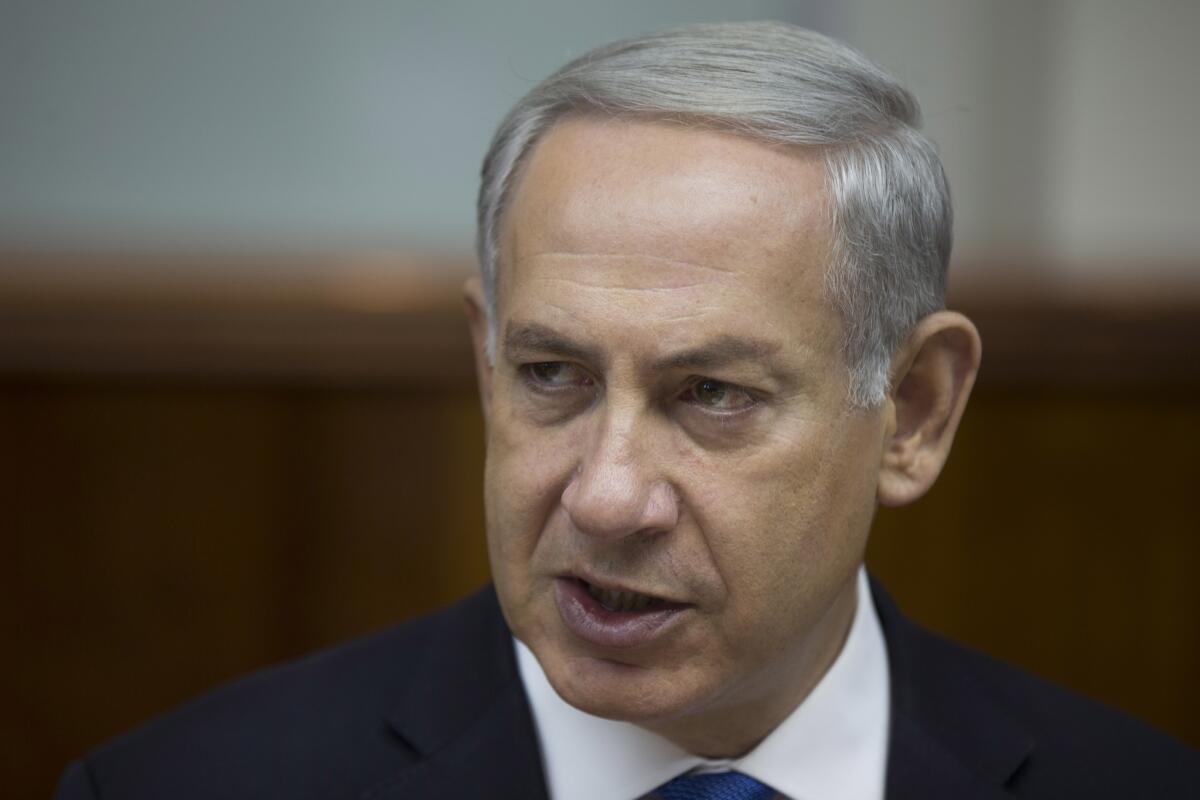In Israel, mixed reactions to diplomatic efforts over Syria

JERUSALEM -- In his most explicit comments to date about the Obama administration’s handling of Syria’s alleged use of chemical weapons, Israeli Prime Minister Benjamin Netanyahu on Wednesday called last month’s attack a “crime against humanity” and called upon the international community to take action.
“This is a grave crime, a crime against humanity,” Netanyahu told a graduating class of naval cadets. “Now, it must be ensured that the Syrian regime is disarmed of its chemical weapons, and the world must ensure that whoever uses weapons of mass destruction pays a price for this.”
Netanyahu spoke after the Obama administration suspended efforts to win congressional authorization for punitive military strikes against Syria and began haggling with Russia over details of a proposal that could have the government of President Bashar Assad surrender its chemical weapons to international control.
In an address from the White House Tuesday, President Obama said he saw “encouraging signs” in the negotiations but argued that the United States must maintain the threat of an attack to put pressure on the Syrian authorities.
Netanyahu said the world’s response to Syria will be watched closely by Iran. Israel, which is believed to possess nuclear weapons, is trying to lobby the international community to prevent Iran from also obtaining a nuclear bomb.
“The message received in Syria will register clearly with Iran,’’ he said.
Netanyahu also repeated a point made in Obama’s speech: That Israel is capable of responding to any attacks.
“Israel can defend itself very forcefully,’’ he said. “This is the basis for our security.”
His comments were echoed by other Israeli officials.
“Diplomacy is always preferable to war,” President Shimon Peres said Wednesday, while on an industrial tour. There was, however a “but.”
The government of Syrian President Bashar Assad must act with integrity and hand over its entire chemical weapons arsenal to be destroyed, Peres said. If Syria wavers, he added, “I have no doubt the U.S. will act militarily.”
Earlier, Israeli Justice Minister Tzipi Livni urged the international community and United Nations to intervene in Syria, saying “fiery speeches are not enough” to uphold values and prevent atrocities.
With the government reverting to a cautious holding pattern, other Israeli officials were reportedly instructed to refrain from commenting publicly. Remarks attributed to unidentified officials, however, revealed mixed positions on the latest developments.
According to Israeli radio, Jerusalem is of two minds on the matter of diplomacy. Like Netanyahu, many argue that failing to respond military to the Aug. 21 attack on pro-rebel suburbs of Damascus would send the wrong message to Iran.
This position was voiced by lawmaker Tzachi Hanegbi, a member of Prime Minister Benjamin Netanyahu’s ruling party, who said the threat of a future strike might “not be credible enough for Iran to give up its nuclear program.”
But others see the negotiations as a potentially positive development.
“This emphasizes how a credible military threat can go a long way in swaying dissident countries, also in regards to Iran,” a “senior political source” told an Israeli website.
Israeli commentators had various takes on Obama’s speech.
“Gory details and a deal with the devil” was how analyst Natasha Mozgovaya summed up the address on the news site Walla [link in Hebrew].
Obama’s speech offered contradicting messages, she wrote, both presenting Assad as “perpetrating a holocaust” against his people and accepting him as “a legitimate diplomatic partner.”
Others had conditional praise for Obama, provided the diplomatic moves work out. Obama refined Theodore Roosevelt’s “speak softly and carry a big stick” policy to “talk tough and carry an iron sledgehammer,” wrote Orly Azoulay-Katz in the Hebrew daily Yediot Aharonot.
“The Nobel Prize winner knows how to be a fighter but prefers to wear a diplomat’s suit,” she wrote.
Although the U.S. managed the crisis in a “clumsy, haphazard” way, it was ultimately the threat of force that “at the 90th minute” brought about the Russian proposal, argued Alon Pinkas, an analyst and former Israeli diplomat. “Of all bad options, this is the best one” for Israel, Pinkas said.
He argued that the time-out for diplomacy changes little. If the initiative fails, Obama may well decide to take military action without seeking approval, he said.
Failure is a real possibility, according to opposition lawmaker Isaac Herzog. Supervising Assad’s chemical weapons “is virtually impossible on a practical level,” he said, urging world powers to make “an unequivocal, determined decision to fully remove all chemical weapons from Syria.”
ALSO:
Car bombs in Egypt’s Sinai kill six military personnel
Syrian opposition divided over Russia’s chemical weapons plan
Gaza shortages worsen as Egyptian government destroys tunnels
Sobelman is a news assistant in the Times’ Jerusalem bureau. Staff writer Edmund Sanders in Jerusalem contributed to this report.
More to Read
Start your day right
Sign up for Essential California for news, features and recommendations from the L.A. Times and beyond in your inbox six days a week.
You may occasionally receive promotional content from the Los Angeles Times.






